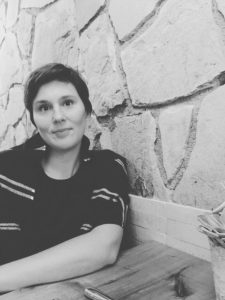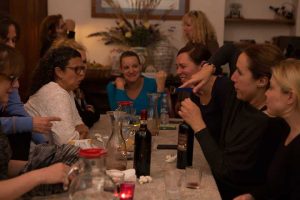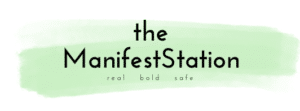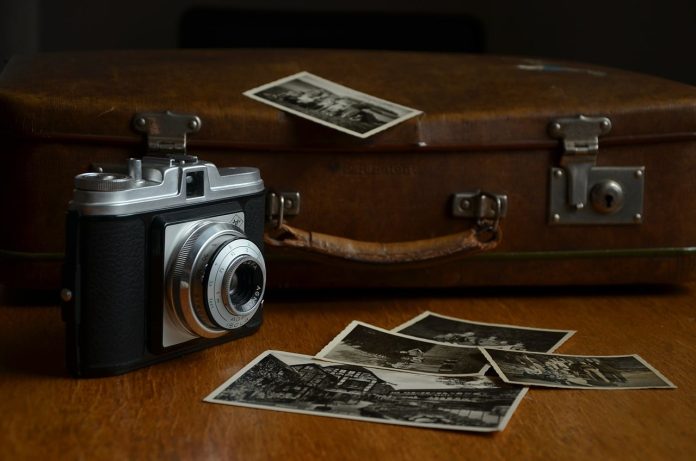By Liska Jacobs
We end up at my mother’s condominium one Saturday, waiting out traffic. She’s at work and we have the place to ourselves so I begin going through cupboards, rummaging through the pantry and fridge just as I did when I was a child coming home from school. I find the burned DVD with ’84-85’ written in my father’s hand in the back of her DVD collection. The air conditioning switches on, there’s a comforting hum that we don’t have in our one bedroom apartment in Pasadena, and we’ve filled a bowl with Goldfish crackers, opened a bottle of sparkling water. We press play.
Fuzz and then a plump young dad, hardly recognizable—younger than either my husband or myself are now. He’s video taping his wife who’s even more unrecognizable, just a girl with big auburn curls and thin, thin arms. How could she have birthed twins? But there they are—my twin sister and me—two baby girls, one dark the other fair.
Then it cuts. They’re playing in a blow up pool now. Naked and splashing. The mother pours water on the dark one, the oldest, me, over and over because they both think it’s funny. Get back here Dolly, she calls to the dark one’s twin, who is pale and small and trying to climb out of the plastic pool. Where are you going? This mother—face and hair so familiar yet alien—calls, splashing at my sister’s backside.
Then the mother is washing a Volkswagen, the two girls spraying each other with the hose while dad off camera shouts Be careful Be careful because their small red wagon is filled with water and the girls are trying to stand in it. Such cute little bums, so naked and adorable, dimpled and shivering from the cold.
There is something like déjà vu here, a mixture of memory and emotion softened by time. But the video cuts are too quick, barely time for my husband to laugh at how silly our nicknames are. I am Ishy, my sister is Dolly. This young mother uses the names during bath time, which is very technical. When the oldest is done she’s lifted into the hiking backpack, which dad wears—there is a quick shot of him in the bathroom mirror, doing the funniest dad wave, like something from a movie or an old timey TV show. He is beaming. And then back to mother and little twin sister. Scrub a dub dub, my mother sings.
Then the girls are in Easter dresses, hunting for Easter baskets and plastic pale colored eggs filled with Rolos and rainbow beans, which are what my dad called Jelly Beans. We—those girls—search for their pet bunny. Floppy where are you? They believe she is the Easter bunny. Their white Mary Jane’s clip-clapping on the stone steps. Such pretty dresses, one pink, the other yellow, both embroidered with tulips on the front. But I don’t understand how to hunt for eggs—this little me with soft brown eyes struggles to follow her dad’s directions. To your right Ishy, your right, your other right. When I fail to find the egg my sister is there, offering a bright green one. This feels familiar. Could I possibly remember this? We are not yet three years old. Dad saying, Aww, what a sweet girl, Dolly. And me feeling embarrassed, dumb. This feeling of inadequacy, of competition, will follow us from childhood into adolescence and adulthood.
In each of our Easter baskets is a strand of plastic pearls. We put them on with great delicacy and smile at the camera with big goofy grins.
A double stroller and a bouncy ball in the park. The camera starts at an awkward moment, my mother is in the middle of speaking. She’s saying, They did the same thing with the other house. But now the camera is pointed at her and you watch her notice this, watch her demure and try to focus the attention back on us. Catch the ball Ishy. Then she says sharply, Dolly where are you going? I recognize something in that tone too. In the look she gives my sister as she toddles off.
Were they happy then? They have marvelous giggles, these girls, Ishy and Dolly—us—even the young parents, especially these young parents.
It’s a strange thing to see yourself then and know what you know now. That my twin sister will live first in Seattle and then Hawaii, that she will spend less and less time with any of us. Or that my parents will divorce in the late nineties, taking each other to court for almost as long as they were married. And that young dad with the funny wave, how he will grow old and fat and struggle with a Multiple Sclerosis diagnosis, bitterness eating him up. Or that I will have a second sister a few years after these videos were made, a brother some years after that. How I have not heard the nicknames Ishy or Dolly in decades.
What happens to childhood? These videos are some thirty years old, yet they don’t feel outside of me. What I mean is I recognize those girls. My sister already trying to escape, how she climbs out of the plastic pool, absconds in the park, Where are you going Dolly? And me, already too soft for this world, too eager, too sensitive. There is one video clip, shorter than the rest, where the young mother with the big beautiful auburn curls says off camera, Dolly do you love your daddy? And my sister, this round-faced pale little girl, looks impish when she shakes her head. My mother saying No? No? I bet you really do, and here comes me, the dark one, the oldest, here she comes, climbing half over the kitchen table to get to her dad, who’s holding the camera, her large dark eyes saying Don’t worry daddy, don’t worry I will love you, her arms out stretched. I recognize myself in that moment, worried for my dad, upset that he might be hurting, believing I might be able to help.
What’s more, I can recognize how those parents look at the little girls, and I mourn for it. You can tell we are precious to them; that we could do no wrong. It’s in their voices, in the blurry out of focus shots of our plump smiling faces. They loved us to the extent all parents do—unconditionally, and with that kind of wild naivety and belief that it would always be this way.
But then we grew up, child and parent both. A distance is created, each has the ability to hurt the other and we did. I remember once, when I was a teenager, arriving home from work to a locked house. My mother was upset that I transferred into a continuation school and had taken my siblings to see the San Diego family for Easter without me. There was a note coldly instructing me to stay with friends. I was hurt, upset, and took great pleasure in slamming a shovel through the dining room window. A piece of glass cut the back of my hand, I still have the scar. Once inside I threw a massive house party. She would throw me out soon after.
Things weren’t much better when I was in my twenties, or now, in my thirties. Sure we’ve made peace, say I love you in emails and on phone calls—we make do at holidays. But I miss those parents in the video. I miss their unabashed love for those two little girls. How in one clip little me pretends to be on the phone, the receiver upside down and backwards, rocking back and forth on my diaper because whoever I’m imagining on the other line is cracking me up, and you can hear my dad’s hushed giggle, his amusement, his love for this tiny human creature. To him, at this moment, I represent all things innocent and curious. Finally he says, Whatcha doing Ishy? You can’t see him, but you can hear the smile.
And I miss those little girls, my sister who I might see once a year. In one clip they dance to Ultravox’s White China, lumbering from one unsure leg to the other, holding hands, their diapers sagging. To them the world has only ever existed with them side by side, anything else is unimaginable. The last time my sister was in town she stayed with friends, I only saw her for drinks and dinner where we talked about her new boyfriend who I had not met; her apartment, which I have never seen.
I miss that lightness of a life not yet planned. My dad working in the movie industry, so sure of himself that he made tentative plans to buy property in Solstice canyon, build the ranch house he always dreamt of—we would have ponies. Then the diagnosis, the same disease that had killed his mother. How that changed things, made him doubtful, the alcoholism more rampant. In elementary school he would disown me for lying to the school principle for using the F word. You are no child of mine, he’d say with drama. The hurtful things I would say to him in my teenage years, or later when I’d side with my mother during the divorce.
I miss childhood and I’m not even sure when it ended. Look at those little girls! The young mother walking with them in the park, the young dad making them laugh with funny noises—how they teach us to pick dandelions and blow them into the wind. Wave girls, wave. And they share a look over our squat awkward hands, which are waving after the seeds, toward the expansive sky.
When the DVD is over I’m filled with longing. We pack up and go to the Macy’s near my mother’s condominium—because that is where the young mother from the video ends up, that is the woman I know now. Working part-time on the weekends to supplement her income, drinking a bottle of chardonnay a night,. But I’m thinking of the clip of when she smiled at us from over our bottles, how she dipped her chin down into her chest so that we blushed a little and cooed. What a couple of flirts you girls are, she said laughing with dad, their eyes tender and heavy.
I find her behind the cashier counter in home furnishings, her big auburn hair muted, greying at the roots, her eyes still bright but grown a bit hesitant. And I watch her see me from across the room—this thirty-two year old me, her daughter yes, but a flawed human being with stories and mysteries of her own. Ishy no longer.
Do I know her any better? What does this woman love, what does she want from life? This must be when childhood ends, when parent and child can stand before one another and see only people—strangers now, filled with the need to make their way back to one another, hurting because they never will.

Liska Jacobs holds an MFA from the University of California Riverside. Her work has appeared in The Rumpus, Los Angeles Review of Books Quarterly Journal, The Millions, Hairpin, The Nervous Breakdown and elsewhere.


Get ready to connect to your joy, manifest the life of your dreams, and tell the truth about who you are. This program is an excavation of the self, a deep and fun journey into questions such as: If I wasn’t afraid, what would I do? Who would I be if no one told me who I was?
Jennifer Pastiloff, creator of Manifestation Yoga and author of the forthcoming Girl Power: You Are Enough, invites you beyond your comfort zone to explore what it means to be creative, human, and free—through writing, asana, and maybe a dance party or two! Jennifer’s focus is less on yoga postures and more on diving into life in all its unpredictable, messy beauty.
Note Bring a journal, an open heart, and a sense of humor. Click the photo to sign up.


